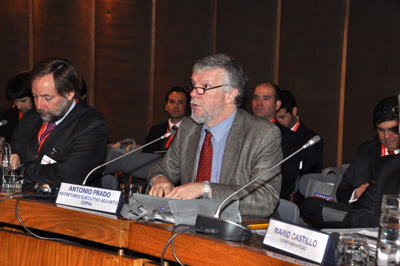Experts Call for Public Policies that Enable Smart Cities to Be Built
Work area(s)
It is estimated that 80% of Latin America and the Caribbean's population will be living in cities by 2015.

(22 August 2013) At a seminar held today at the headquarters of the Economic Commission for Latin America and the Caribbean (ECLAC) in Santiago, Chile, authorities and experts discussed the public policies needed to build smart cities that will improve the quality of life of citizens in Chile and the rest of Latin America and the Caribbean.
The Smart Cities Summit 2013 - Building the cities of tomorrow, today was organized by ECLAC and the País Digital Foundation, with the support of the Government of Chile. It brought together authorities, international officials, academics and private-sector representatives.
The opening session featured Antonio Prado, Deputy Executive Secretary of ECLAC, Pedro Pablo Errázuriz, Chilean Minister of Transport and Telecommunications, and Pelayo Covarrubias, Chair of the Board of the country's País Digital Foundation.
According to Antonio Prado "The region's countries now recognize the potential of information and communications technologies (ICTs) in education, health, information access, public services, transparency and participation, thanks to awareness-raising and the exchange of experiences in the framework of eLAC, for which ECLAC is the technical secretariat".
According to data from the ECLAC Regional Broadband Observatory (ORBA), between December 2010 and May 2013, broadband access charges fell by 68% in nine of the region's countries. In addition, average Internet access speed rose by 235% between March 2010 and June 2013 in the same number of countries.
These two factors make it possible to build smart cities, which is fundamental for the region, considering that 80% of Latin America and the Caribbean's population will be living in cities by 2015, thereby increasing the challenges of environmental sustainability, transport, employment, security and competitiveness.
This situation calls for policies that facilitate the efficient use of resources and improved service delivery in urban centres, according to Antonio Prado, who stressed that the smart city concept does not just refer to the physical communications infrastructure, but also more importantly to social connectivity and human capacities to achieve these connections.
According to Mr. Prado "The smart cities paradigm is based on how to create the right conditions to generate knowledge, skills and empower citizens by means of technology". He added that cities can be successful not only by universalizing technology use, but also by connecting people to collaborate, interact and shape urban development.
The Deputy Executive Secretary of ECLAC summarized this as follows: "There can be no smart cities without smart citizens".
According to Pedro Pablo Errázuriz, Chilean Minister of Transport and Telecommunications, one of the current challenges of smart cities is "how to measure how smart a city is, or the city's IQ [...] The future is very close in this area. We have the right tools and capacities to make major progress".
The Chair of the Board of Chile's País Digital Foundation, Pelayo Covarrubias, underscored the need to promote authorities, universities and private companies working together: "We want to improve city administration" by incorporating best worldwide practices and developing a Chilean model.
Other participants included the United States academic, Boyd Cohen, who has created a new conceptualization of smart cities, and the Director of the Smart City World Congress in Barcelona, Pilar Conesa.
Two roundtable discussions were organized following the seminar: an institutional one for ministers, universities and non-governmental organization; and a technical one for companies. The first one discussed basic guidelines for public policies that would help to build smart cities, while the second presented smart city initiatives and activities carried out by companies.
See also:
Any queries should be sent to the ECLAC Public Information and Web Services Section.
E-mail: prensa@cepal.org; Telephone: (56 2) 2210 2040.
Country(ies)
- Latin America and the Caribbean
-
Chile
Contact
Public Information Unit
- prensa@cepal.org
- (56 2) 2210 2040